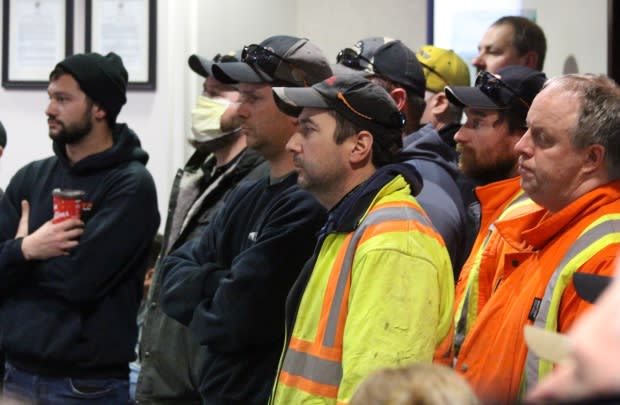Moncton to use more private contractors to collect garbage
Moncton plans to fill vacant unionized garbage collection jobs with private contractors for at least six months, a move the union representing city workers decried Monday.
City staff cited climbing injury rates and retention issues as reasons to bring in outside help until council holds another vote on whether to make a permanent switch to a private contractor.
Council approved the decision in a split vote Monday as members of Canadian Union of Public Employees Local 51 stood in council chambers for the multi-hour debate.
"What council decided is that we really don't care about the injuries, we're just going to pass them on to somebody else," Marco Salib, a national representative of the Canadian Union of Public Employees, told reporters after the vote.

Jack MacDonald, the city's general manager of engineering and environmental services, said the seven garbage collection positions are often filled for a few years before a person moves to another role within the city workforce.
He said he fears jobs won't be filled fast enough this spring, leading to trash collection problems. MacDonald said most communities in the region use private contractors, including Riverview and Dieppe.
The city's curbside residential waste collection system divides the community into seven zones. Six are handled by the seven city workers and five trucks.
The city approved using Fero Waste and Recycling Inc. for one zone in 2017 as a test case as soft tissue injuries rose. Councillors voted last year to return to internal workers only. Staff said that's yet to happen because of turnover.
Tossing eight to nine tonnes
The worker drives the truck, gets out, tosses the bags into the truck, then continues to another home. Each worker tosses approximately eight to nine tonnes of material into a truck from about 650 households per shift, according to figures presented by staff.
A 2017 risk assessment looked at ways to reduce injuries on the job. It recommended adding a second worker to each truck, reducing the pace and volume or work and adding a mechanical arm to trucks which would grab large bins.

The existing system costs $1,573,169 to operate. Each household pays $64.43 per year.
The city estimates a private contractor would cost $1,521,700, or $62.32 per household.
Adding a second city worker to each truck, with one driving and the other collecting before switching, would increase the annual total cost to $2,408,868, or $98.66 per household.
The mechanical arm is estimated to cost $2,696,628 per year or $110.44 per household. The switch would include the purchase of three large bins per household.
The contractor crews would also use a two-person truck, though MacDonald said they likely spend about half as much on labour as the city. The city paid collection workers $28.41 per hour, plus benefits, last year.

Coun. Blair Lawrence pointed to "perplexing and worrisome" rise in lost time due to injuries related to garbage collection.
He cited figures indicating there were almost no days lost in 2014. That grew to 65 days the following year, 229 in 2016 and 537 in 2017. He said the city faced about $45,000 in workmen's compensation costs, a figure expected to double this year.
"Nothing is black and white about this issue, except we have an issue of safety and we have a financial responsibility to the public," Lawrence said.

Councillors Shawn Crossman, Paulette Thériault, Brian Hicks and Paul Pellerin voted against the motion. Coun. Bryan Butler was absent.
Hicks objected to the move as council interfering in contract talks. The union's contract expired in December and talks are ongoing.
Hicks suggested the city should have carried out a third-party study to gather more information. He called it a major decision on par with privatizing operation of the municipal water treatment system.

